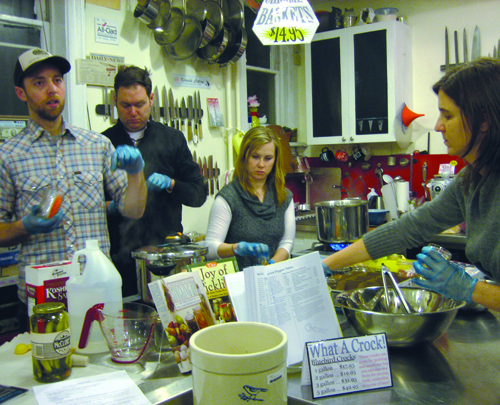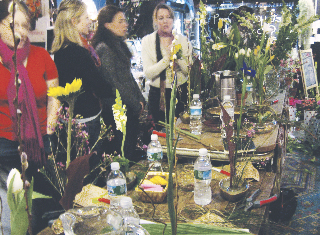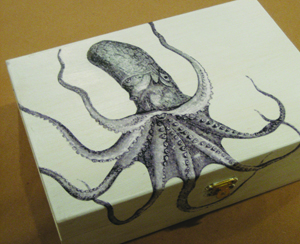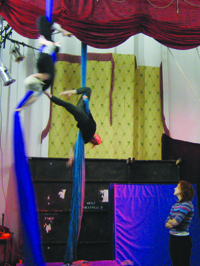 Not all of us are natural students, and many of us no longer have the patience to endure long lectures or do homework on a regular basis. But there are very few of us who don’t appreciate the value of acquiring a new skill set, especially one that’s fun, even to the point of relative uselessness. The WG took the time to sample some of the neighborhood’s most intriguing classes, some of which have more practical applications (flower arranging), and others that are more difficult to apply to everyday life (aerial tricks!). Williamsburg/Greenpoint is a collection of creative minds that need constant stimulation, and though the internet can teach you a lot of things, there’s something to be said for taking a stroll, rolling up your sleeves, and seeing what live instruction has to offer.
Not all of us are natural students, and many of us no longer have the patience to endure long lectures or do homework on a regular basis. But there are very few of us who don’t appreciate the value of acquiring a new skill set, especially one that’s fun, even to the point of relative uselessness. The WG took the time to sample some of the neighborhood’s most intriguing classes, some of which have more practical applications (flower arranging), and others that are more difficult to apply to everyday life (aerial tricks!). Williamsburg/Greenpoint is a collection of creative minds that need constant stimulation, and though the internet can teach you a lot of things, there’s something to be said for taking a stroll, rolling up your sleeves, and seeing what live instruction has to offer.
Pickling (Canning) Class
at The Brooklyn Kitchen
616 Lorimer Street
(718) 389-2982
The Brooklyn Kitchen offers some of the wildest, most delectable classes around, even appealing to kitchen-phobes and self-proclaimed non-cooks like myself. I can barely manage to turn out an al dente pasta, or save a Pillsbury roll of cookies from the burn of neglect, and yet, when I heard there was a knife skills class available at the BK, it was all I could do not to pre-order myself a set of Ginsus. The classes range from $25-$75; some are demonstration-based, others are more interactive. The pig butchering class sends you home with eight pounds of swine, while the pickling class urges students to bring any vegetables they’ve been “dying to pickle” for a week-long test run in the brine jar. The cake decorating and fondant classes are taught by a contestant from the Food Network Challenge. The BK’s staff is slightly disaffected, but eventually they warm up, and it’s clear they’ve got good instincts about what off-kilter classes might add gas to your fire.
After perusing the options, I decided to take a pickling (specifically, canning) class with Bob McClure, of McClure’s pickles. The first thing I learned is that if you go into a canning class, you’re going to come out smelling like vinegar. But isn’t that a small price to pay for learning how to turn your seasonal vegetables into salty, savory, sometimes even spicy, preserved delights? McClure will teach you what to look for in foods you pickle, how to sterilize your equipment, and, most important, how to keep tabs on your PH levels so you don’t infect your friends and family with life-threatening bacteria.
The main drawback of the pickling class was that it involved a lot of standing around. I would have liked to get my hands dirty a little, but the demo kitchen is small, and it turns out canning, which involves hot glass and scalding water, is kind of a dangerous process (not ideal for group participation). I’m also a huge proponent of instant gratification, and there was something anticlimactic about watching a man prepare something for an hour only to hand you a jar and tell you to wait a week to consume its contents.
New classes are posted at the middle of each month on the BK’s website and sell out quickly, sometimes within one or two days. The next round will go up on March 16, and April is Egg Month, so expect new classes to be breakfast-themed. Learn more here.
 Ikebana
Ikebana
at Rose Red & Lavender
653 Metropolitan Avenue
(718) 486-3569
The last place I ever expected to find myself on a frigid weekend night in early March was among chirping birds and sweet bouquets, arranging flowers. But I was thrilled to spend two hours at Rose Red & Lavender, a charming full service flower shop by the Graham Avenue L train, to try my hand at Ikebana, the modern, minimalistic Japanese art of flower arranging. Joining me around a wooden table heaped with fresh tulips and irises, broad, waxy leaves, and twisted willow branches, were six other ladies, many of whom had been directed to the shop’s perpetual indoor Springtime by an email tip from Daily Candy. (“This place is only three stops out of Manhattan—not so bad!”)
It turns out Ikebana’s core rules are quite recession friendly (not many flowers are needed in this art), and you pretty much can’t go wrong so long as you follow a few simple guidelines, which were laid out for us by Lisa, the instructor. A few blooms, tufts of twisted grass, and artfully placed stalks of curly willow will qualify your masterpiece as a genuine interpretation of Ikebana, as long your elements are arranged to represent the three levels of the life cycle (heaven, man, earth). My arrangement was the picture of minimalism—three long, slender white iris stalks courting the heavens in various stages of bloom. With Lisa’s cheery encouragement, I was actually proud of my living composition. And since irises are a pretty hearty breed, it took me nearly six days to kill my pristine arrangement with the neglect I show all plants unlucky enough to enter my apartment.
Though the class didn’t necessarily impart any skills or sage advice you couldn’t learn from a book, the luscious atmosphere and warm group vibe made the evening worthwhile. The cost is $125 for a series of three classes, with an arrangement to take home each session. I was most excited about keeping the gardening clippers. Owner Kimberly is open to suggestions for future classes (English arrangements? Topiary?), but composting is up next. So get your ish together and get over there. Click here for details.
 Walk-In Crafting
Walk-In Crafting
at Spacecraft
355 Bedford Avenue
(718) 599-2718
A brief mention on my Facebook status that I had taken a crafting class at the recently-opened Spacecraft on Bedford prompted immediate responses from four of my friends, like, “That was my new years resolution—be more crafty!” or “Can I come with? Please?” Apparently there is more than enough interest in crafting for this place to take flight.
Christina and Stella, the lovely ladies of Space-craft, want their store/workshop, tucked just north of the Williamsburg bridge, to be a place where people come to hang, meet people, and craft. To that end, Spacecraft boasts a menu of over 20 affordable craft projects you can walk in and pick up at any time-including stamp making (foam and rubber, $15-40), sculpting (beeswax and clay, $20-35), and decorating (cards, clothing, and even a skateboard, $10-45). Want to make something out of sculpey? Walk on in. I can already think of a Halloween prop I will be making out of papier mâché.
A wide range of materials are at your disposal—from felt and plaster to appliques, rhinestones and seaglass. Kids can make the most decadent crowns in town with all the glitter in this place, but tools are also available to make polished, professional projects. The 12-year-old me wanted to commandeer a t-shirt and drench it in glitter puff paint before bedazzling the bejeezus out of it, but for my initial foray into Spacecrafting I chose to quell my grade school instincts and decoupage a wooden box instead. Christina had enough foresight to drape me in a massive denim apron before I began to inexpertly brush the grainy surface in white paint and plaster it with a photocopied image of an octopus from the store’s overflowing box of stored images. Though I had decoupaged a few times before, I asked a question a minute during the octopus application phase of Project Wooden Box, and Christina and Stella answered my queries with easy patience. It was like a private tutorial. I finished my session with a beautifully matted, sparely decorated treasure box in hand, prompting Christina to comment, “You’re probably still carrying around your sense of Japanese minimalism from the flower class.”
The one downside to Spacecraft’s open crafting is that it only takes place during store hours, which during the week fall during the normal working hours of 10am-6pm. But plenty of classes are available on weekends or in the evenings, including the upcoming kids series Art in the City (March 10, 17, & 24) and a three session screenprinting tutorial (March 25, April 1 & April 8) that costs just $175 and sends you home with the materials to print in your living room.
 Aerial Silks
Aerial Silks
at the Skybox
342 Maujer Street
When people think of New York, they think of small spaces. Cramped apartments, cubicles, tiny office kitchens. Brooklyn has changed that a bit, with the loft and the warehouse and the sprawling park, but I still never expected there to be a place where you could practice trapeze indoors right in my own backyard.
The Skyhouse is a warehouse cabaret—half lofty space, half plush, high backed velvet couches, props, and circus equipment. Co-founders Jordann Baker and Anya Sapozhnikova started the space as part of the new incarnation of The House of Yes, a creative collective and one-stop shop for the production of lavish DIY circus productions. With 32-foot ceilings, the Skybox is the only spot in the NY metropolitan area created specifically for the practice of aerial stunts, and when you walk in to a set of advanced students doing “the Tick Tock Drop,” wrapping their legs in purple silk 20 feet in the air and hurtling to the ground as it unravels, you are awed by what can be accomplished when people are given some space to work with.
Though clearly aerial enthusiasts are intense about their craft, my classmates were are also quite sweet, and immensely graceful. Aerial and circus sports are especially popular with dancers, actors and others looking to add another layer to their breadth of performance skills. The class is adaptable to many skill levels, which made it easy for me to enter as a beginner on a day when some well-trained people were also on the mats. I spent most of the session learning to inch up the silks like a caterpillar, and a few minutes at the end attempting to do some tricks, my arms spread like wings, and my body contracted in an upside-down tuck position. I woke up the next day with a soreness in my arms that I haven’t experienced since lugging two gallons of paint from the Manhattan Home Depot all the way to Clinton Hill. Joanna assured me the strength comes quickly with practice. Perhaps if (when?) I try again, I’ll only be in one gallon’s worth of pain.
The Skybox also offers classes in Lyra (the aerial hoop), static trapeze, and even hula hooping. Ballet classes focus on helping you improve your grace in the air, and open workshops on stilting, juggling and other circus tricks are also available on a weekly basis. It is necessary to email or call in advance for class reservations (class sizes are small to give the necessary focused attention) so instructors can account for varying levels of experience in advance. Classes are $25-30, depending on class size, which is expensive if you’re a regular, but not too much to ask for the gift of temporary flight.
Leave a Reply